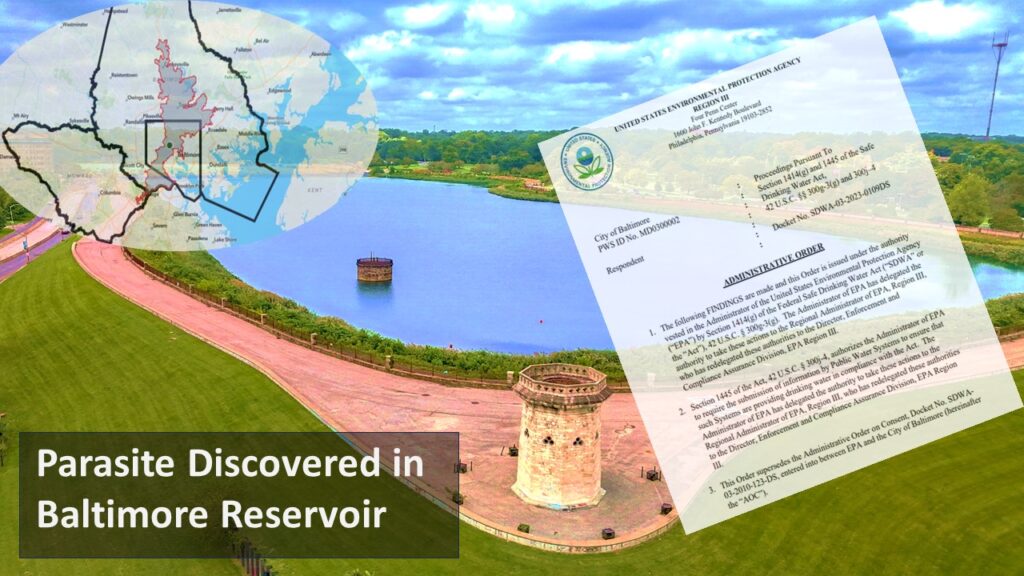Parasite Discovered in Baltimore Reservoir causing heightened concerns about water safety in the region. The finding has prompted local authorities and environmental agencies to take immediate action to assess and address the potential risks associated with this discovery. During a regular examination conducted by the crew members of the Baltimore City Department of Public Works, they discovered traces of Cryptosporidium in the lake.
According to a press release from the public works department, Cryptosporidium is a microorganism known to potentially induce gastrointestinal issues such as diarrhea, vomiting, fever, and abdominal discomfort. It is important to note that individuals in vulnerable demographics, including children, the elderly, and those with compromised immune systems, are more susceptible to experiencing these symptoms if exposed to this parasite.
Parasite Discovered in Baltimore Reservoir

The press release also reassures that individuals with robust immune systems typically do not face any significant impact, and they often recover without the need for medical intervention. The identified parasite, known by its scientific name, Cryptosporidium, is a minute organism that typically thrives in freshwater habitats. Unfortunately, this particular species is notorious for its potential to cause waterborne illnesses in humans. As a result, health officials are urging residents to exercise caution when utilizing water sourced from the affected reservoir.
What is Cryptosporidium?

Cryptosporidium is a microscopic parasite that can cause gastrointestinal infections in humans and animals capable of inducing gastrointestinal issues like diarrhea, vomiting, fever, and abdominal discomfort. It belongs to a group of single-celled organisms known as protozoans. When ingested, Cryptosporidium can lead to a condition called cryptosporidiosis. The parasite is commonly found in soil, food, water, or surfaces that have been contaminated with infected feces. It has a protective outer shell that allows it to survive outside a host for extended periods, making it resistant to many typical disinfection methods.
Cryptosporidiosis primarily affects the intestines, leading to symptoms such as diarrhea, stomach cramps, nausea, and dehydration. These symptoms are especially problematic for individuals with weakened immune systems, such as those with HIV/AIDS or certain medical conditions, as well as young children and the elderly.
Preventing Cryptosporidium infection involves maintaining good hygiene practices, including thorough handwashing, avoiding ingestion of contaminated water or food, and properly handling and cooking food. Additionally, treating water sources can help reduce the risk of transmission. Due to its resistance and potential to cause significant health issues, Cryptosporidium is a concern in both public health and environmental contexts, particularly in relation to water quality and sanitation.
Parasite Discovered in Baltimore Reservoir Key Facts
The Presence of Cryptosporidium in our water supply is at low levels, suggesting a minimal risk for the majority of the population. For most individuals, the water remains suitable for consumption. Nevertheless, those in vulnerable groups are advised to exercise caution.
The presence of this microorganism is limited to the water systems in Baltimore City, as well as Baltimore and Howard counties in Maryland. Despite the potential health implications of Cryptosporidium, the detected levels suggest a “low risk for the general public” and do not present an immediate health hazard.
Precautions to be Taken
The DPW has collaborated with the Baltimore City Health Department, which has concluded that, given the low risk, most residents do not need to take additional precautions unless they have a compromised immune system. Exposure to Cryptosporidium may lead to cryptosporidiosis, with symptoms including diarrhea, vomiting, fever, and abdominal discomfort. Individuals with robust immune systems typically experience minimal impact and often recover without medical intervention.
Those with weakened immune systems, such as individuals with HIV/AIDS, those with inherited immune disorders, cancer patients, and transplant recipients taking specific immunosuppressive medications, are advised to:
- Opt for bottled water.
- Boil water for one minute before consumption.
- Employ a tap water filter meeting ANSI/NSF 53 or 58 standards, or a filter designed to remove particles 1 micron or larger. Look for filters labeled as “absolute 1 micron” (not akin to Brita-type filters).
Testing of Druid Lake Reservoir
This examination was carried out in accordance with DPW’s recently revised Administrative Order on Consent between the City of Baltimore and the U.S. Environmental Protection Agency (EPA), which mandates sampling for Cryptosporidium and Giardia at the City’s uncovered finished reservoirs. The finalization of work on the remaining two uncovered finished reservoirs, Ashburton and Druid Lake Reservoir, is anticipated by November 30, 2023, and December 30, 2023, respectively.
Samples were gathered on September 19, 2023, from the Druid Lake uncovered reservoir. The subsequent testing revealed a detection of 0.09 Cryptosporidium Oocyst per Liter. These samples underwent thorough laboratory analysis, with results returned within seven days; the outcomes for this month’s test were available on September 26, 2023. Monthly sampling carried out at Druid Lake Reservoir in August displayed no indications of Cryptosporidium.
It is important to note that recent monitoring results affirm that the source water remains unaffected by Cryptosporidium. The source water is drawn from the Liberty, Loch Raven, and Prettyboy reservoirs, as well as the Susquehanna River during drought conditions, all of which contribute to the City’s water supply. DPW takes measures to treat source water for Cryptosporidium as part of the water filtration process, ensuring its safety before it reaches the finished water reservoirs. According to the Centers for Disease Control and Prevention, this parasite is prevalent in every region of the United States and around the world.







